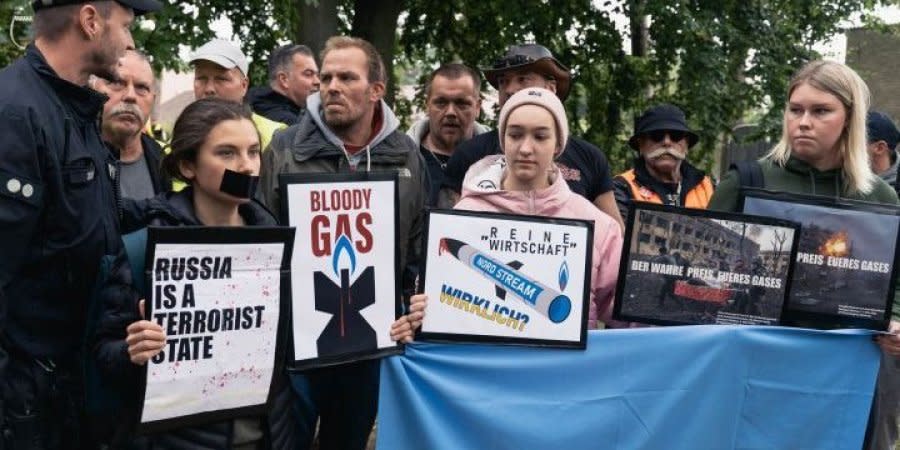German far-right activists attack Ukrainian women at rally in support of Russia

While their placards were destroyed, none of the women were seriously injured, in the incident, which occurred on Sept. 25 in the town of Lubmin in the north of Germany.
The rally was in support of the relaunch of Russian gas supplies to Germany and the cancellation of sanctions against Russia. Lubmin is close to the point where the Nord Stream and Nord Stream 2 undersea gas pipelines come ashore in Germany.
About 3,500 people from various regions of Germany took part in the rally.
When the leaders of the pro-Russian movement began to address rally attendees, three Ukrainian women activists approached the stage in a silent protest and displaying posters in support of Ukraine.
The posters called for Russia to be declared a terrorist state and noted the price of “blood gas” from Russia. They included world-famous photos of the shelling of residential quarters and a maternity hospital in Mariupol, as well as a photo of a residential building in Borodyanka that was destroyed by a Russian bomb.
This silent protest with photos and posters caused an extremely aggressive reaction from the rally attendees.
Read also: Gazprom concocts new excuses to continue shutdown of Nord Stream-1
They grabbed the posters and photos from Ukrainian women, tore them, and pushed the Ukrainian women away from the stage. Rally participants with drums in their hands then confronted them with loud, mocking shouts.
The stewards observing the rally had to stop overly aggressive behavior by some of the rally participants.
The Ukrainian protest was organized by Maryana Yaremchyshna, who has been living in Greifswald, a town neighboring Lubmin, for several years, and who is one of the leaders of the local pro-Ukrainian movement, as well as two other Ukrainian women who were forced to leave Ukraine due to the war.
All three women have been organizing monthly actions in support of Ukraine in the center of Greifswald since the beginning of Russia’s invasion of Ukraine.
Yaremchyshna told NV that she was surprised by the absence of a German counter-protest at the rally in Lubmin on Sept. 25. According to her, many Germans supported the Ukrainian protest after the action, but only virtually.
“Our small action of a few minutes caused a great stir among Germans on the Internet: they are now writing comments, supporting us, reposting these videos, writing personal messages that are very grateful to us,” says Yaremchyshna.
Read also: Germany faces recession and double-digit inflation, forecast says
“But there were no (local) people who supported us at the rally itself. Usually, when right-wing radicals organize some kind of rally, it is imperative that – at least, it used to be so – a rally against is also registered. This time, no one registered anything like that. These people do not go out. And this also surprises me a bit – they stay in their comfort zone, thank us for what we do, but do not come to our actions (in particular, other actions in support of Ukraine), they do not organize counter-rallies (against the far-right activists).”
The Ukrainian woman noted that this reminds her of “the behavior of those Russian citizens in Russia who condemn the war, but just sit at home: they are afraid to protest and as a result, nothing changes, of course.”
The confrontation between Ukrainian activists and supporters of Russia and Russian gas attracted attention from many German media, in particular, broadcaster NDR and newspapers Ostsee Zeitung, Die Welt, etc. Die Welt mentions that its journalists were called “dirty pigs” by the right-wing extremists.
Read also: Russian spokesperson blames western sanctions for Nord Stream-1 shutdown
Martin Klein, a member of the Die Basis party, was the organizer of the rally. This party is based in Berlin and emerged in Germany in 2020 – initially as a movement against coronavirus restrictions and vaccination against COVID-19. Now the political party calls itself the “party of peace” and calls for the appeasement of Russia.
In addition, the German far-right activists were among the leading participants of the action in Lubmin. In particular, Andreas Kalbitz, a former member of the Alternative für Deutschland (AfD) party, took the stage among the speakers. Kalbitz was the head of the Brandenburg branch of this nationalist and right-wing populist party.
According to the local media outlet Katapult, Kalbitz is currently under the supervision of the German Federal Office for the Protection of the Constitution and is officially considered a right-wing extremist. Previously, Kalbitz was also a member of the currently banned neo-Nazi German youth organization Heimattreue.
Radical German demonstrators who marched in a column through the streets of Lubmin on Sept. 25 and gathered at the summer stage held posters with anti-government and pro-Russian slogans (“Open Nord Stream 2! Stop sanctions! Don’t supply weapons!”, “Our government must resign”, and “Turn off the traffic lights” – Germany’s ruling three-party coalition is called the “traffic light” coalition because its constituent parties’ colors are those of traffic lights).
Read also: Europe can win Putin’s gas war but must learn Nord Stream lessons
This is not the first such anti-government and pro-Russian action in Lubmin: about 1,800 participants gathered for a similar rally in early September. On Sept. 25, the organizers expected 5,000 participants, however, according to the police, they gathered only 3,500 people.
Earlier Russian gas monopoly Gazprom announced a complete shutdown of gas supplies through the Nord Stream 1 pipeline, allegedly for technical reasons.
Germany has frozen the Nord Stream 2 project since the beginning of Russia’s invasion of Ukraine.
Read the original article on The New Voice of Ukraine

